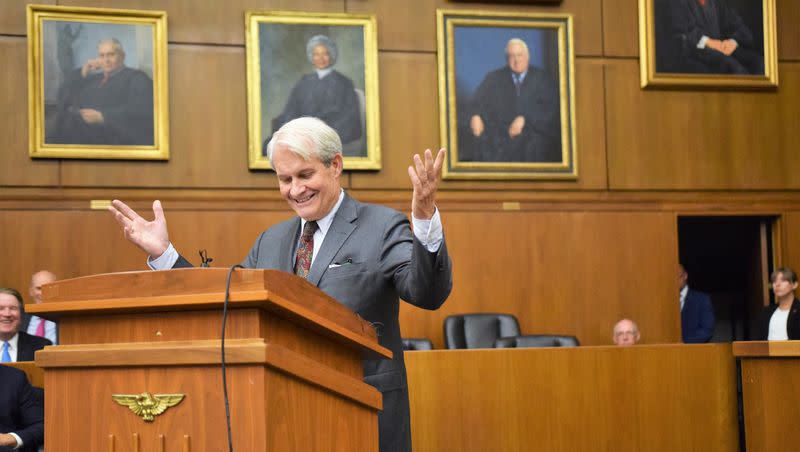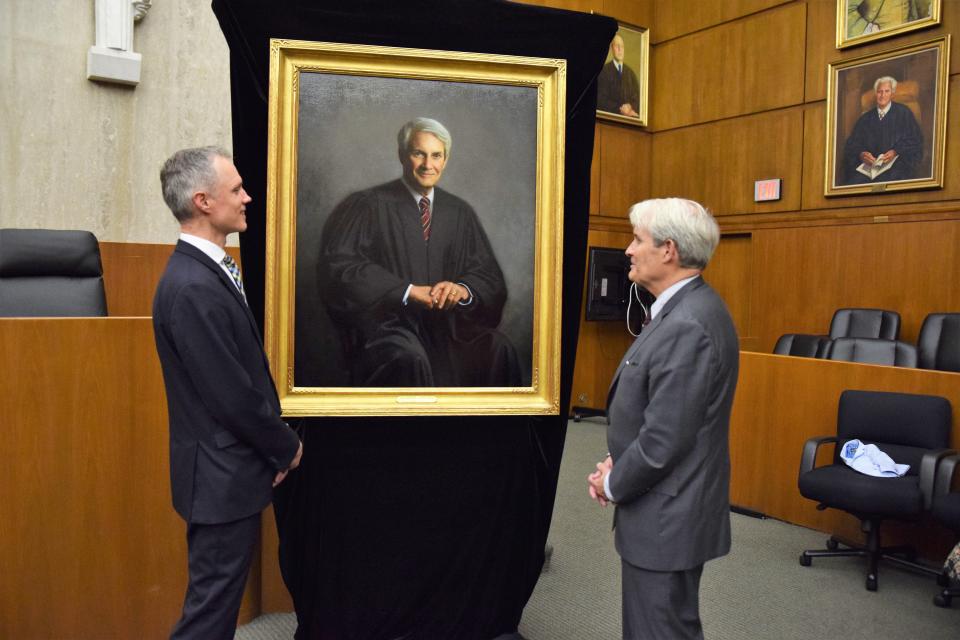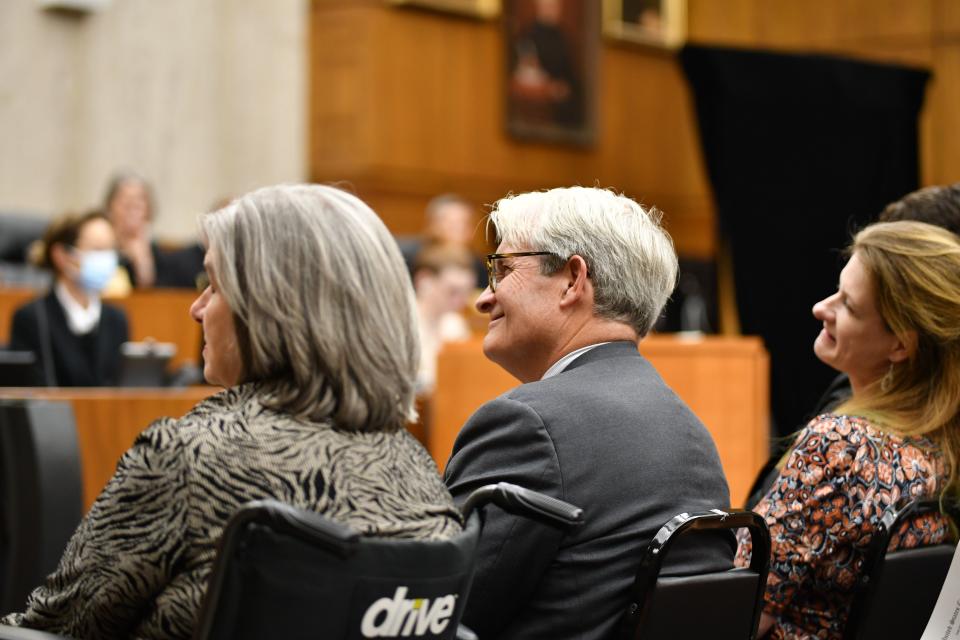Former BYU general counsel and federal judge returns to Washington, D.C., for portrait unveiling

- Oops!Something went wrong.Please try again later.
- Oops!Something went wrong.Please try again later.
The magazine The New Republic once listed Thomas B. Griffith — the now retired federal judge and chief legal officer of the United States Senate — among “Washington’s Most Powerful, Least Famous People.”
Last week, however, Griffith became a bit more famous.
A courtroom full of family, former colleagues, and an assortment of Washington, D.C., dignitaries — including five sitting Supreme Court Justices — gathered to honor Griffith’s judicial career and witness his official portrait unveiling in the chambers of his former court, the United States Court of Appeals for the District of Columbia Circuit, known in Washington as the “second highest court in the land.”

Presided over by both Chief Judge Sri Srinivasan of the D.C. Circuit and Chief Judge John Roberts of the U.S. Supreme Court, the unveiling ceremony highlighted Griffith’s devotion to his faith, family, judicial oath, and the work of political reconciliation.
The proceedings also featured numerous references to BYU sports and the 1966 film “A Man for All Seasons.” Griffith is an unabashed fan of both.
Several law clerks and judges paid tribute to Griffith during the ceremony, including Jeffrey Sutton, a fellow George W. Bush appointee serving as the chief United States circuit judge of the United States Court of Appeals for the Sixth Circuit, and Merrick Garland, attorney general of the United States and one of Griffith’s former colleagues on the D.C. Circuit. Griffith retired from the bench in 2020, but remains special counsel at the law firm of Hunton Andrews Kurth and a fellow at the Wheatley Institute of Brigham Young University.
‘Go Cougars’
The ceremony began with Srinivasan, who grew up cheering for the University of Kansas, assuring the audience Griffith comported himself with “exemplary judicial temperament” while the two exchanged text messages during the recent BYU-Kansas football game.
And one of Griffith’s former law clerks, Michael Gottlieb, now a partner at Penta Group, concluded an eloquent tribute replete with literary references with, “There’s only one thing left to say: Ra, ra, ra, ra, ra. Ra, ra, ra, ra, ra. Ra, ra, ra, ra, ra. Go Cougars.”
Fittingly, former president of Brigham Young University Kevin Worthen and his wife, Peggy, were in attendance at the ceremony.
Garland shared a rare but humorous lapse in Griffith’s “judicial temperament.” Griffith and his family attended a BYU-Utah football game during Griffith’s tenure as BYU’s general counsel. Sitting in the University of Utah’s president’s box, Griffith told his children in “no uncertain terms, that there was to be no disrespectful boasting when BYU scored.” Nonetheless, Garland said, after BYU made a game-winning touchdown, “Tom had to be pulled down from a chair while celebrating.”
The majority of Garland’s remarks focused on ways Griffith’s moral character and religious faith inspired a life of public service, community building and political reconciliation.
Atonement, Garland said, paraphrasing one of Griffith’s speeches, “‘is the idea that those things which are separated can be brought together. ... A lawyer can be a tool of atonement rather than a source of division.’
“Tom believes judges and lawyers as citizens may argue,” he continued, “but they must do so with the realization that those with whom we disagree are not our enemies, but rather our partners in the great experiment of American democracy.”
A man for all seasons
Multiple speakers noted Griffith’s love for Robert Bolt’s famous play, later adopted into the film, “A Man for All Seasons.” The story focuses on Sir Thomas More’s real life refusal to break his oath amid increasing pressure from King Henry VIII.
Aimee W. Brown, assistant to the solicitor general of the United States and one of Griffith’s former clerks, sprinkled in various references to “A Man for All Seasons” in her tribute. And while underscoring Griffith’s insistence on weighing all sides of an argument and urging spirited disagreement and debate, she said, “I recall one particular discussion between the judge and one of my co-clerks in which Judge Griffith asked him if he thought a certain view was correct.”
She continued, “My co-clerk quickly and forcefully responded, ‘God, no!’”
Judge Griffith then joked in response: “You can just call me judge.”
“The quip perfectly encapsulates Judge Griffith’s humility and his embrace of Thomas More’s embrace of the limits of his own role. Back to ‘A Man for All Seasons,’ More says, ‘I know what’s legal, not what’s right. And I’ll stick to what’s legal.’”
The film “A Man for All Seasons” was quoted so often throughout the ceremony in honor of Griffith that by the end Srinivasan joked “now we will dim the lights and all watch ‘A Man for All Seasons.’”
Civic charity
Several speakers acknowledged Griffith’s public writing on political reconciliation.
Retired Judge David Tatel, a former colleague and longtime friend of Griffith’s on the D.C. Circuit, discussed their shared commitment to impartiality despite personal political differences.
“On the bench, despite how we occasionally disagreed, we were of one mind about how to be a judge. As Judge Griffith himself put it, ‘should judges yield to the temptation to apply their own views about what’s right and fair, they not only flout the Constitution but also undermine the very foundations of democratic governance.’”
“That is exactly right,” Tatel added. “Judge Griffith’s devotion to the principles of judicial collegiality, I have come to understand, are shaped by his Mormon faith. Civility and community building, he’s written, ‘are among the most important spiritual work to which we are called.’”
Griffith, he said, engages in the “hard work of shaping principled disagreement into community consensus.”
Sutton, who got to know Griffith as they both lectured together at Harvard Law School, noted how Griffith came to the law in “fits and starts.” After BYU, Judge Griffith went to University of Virginia law school only to drop out during his first year.
Griffith spent the next three years working “for the church offering religious education to high school and college students.” Three years later, Sutton recounted, “he started law school all over again just after his initial classmates had graduated.”
“I suspect those three years had a lot to do with the person, lawyer and judge he became.”

Griffith’s remarks
In brief remarks, Griffith expressed gratitude and love for his wife, Susan; members of his family; and the many colleagues and friends who gathered for the occasion.
One of Griffith’s former clerks traveled from South Korea and participated in physically unveiling the portrait. Griffith also thanked the portrait artist Jonathan Linton, a fellow BYU graduate, who Griffith said took special care to involve Susan Griffith in the portrait process.
“When I was a teenager,” Griffith said, “a wise spiritual teacher promised me I would have the love, confidence and companionship of good people throughout my life, and I would have friends raised up to me in time of need.”
He continued, “The fulfillment of that promise is one of the greatest blessings of my life.”
Griffith also addressed the “toxic political polarization” which he said “poses an existential threat to the Constitution.”
“It’s up to the judiciary, I believe, to show the nation how to engage in reasoned argument with respect for one another. My colleagues on the D.C. Circuit showed me how to do that.”
Quoting President Dallin H. Oaks, first counselor in the First Presidency of The Church of Jesus Christ of Latter-day Saints and a former judge, Griffith said, “The Constitution requires that on contested issues we should seek to moderate and unify.”
“Properly understood,” Griffith continued, “when we take the oath to support and defend the Constitution, we pledge that we will be agents to reconciliation.” George Washington wrote the Constitution succeeded because of a “spirit of amity,” “mutual deference” and “concession,” Griffith reiterated.
“Unless we exercise those virtues today,” he concluded, “I fear we will lose the Constitution — the Constitution we have sworn an oath to God and to our fellow citizens to support. I am grateful to have been part of a court that models that sort of commitment to the Constitution.”

